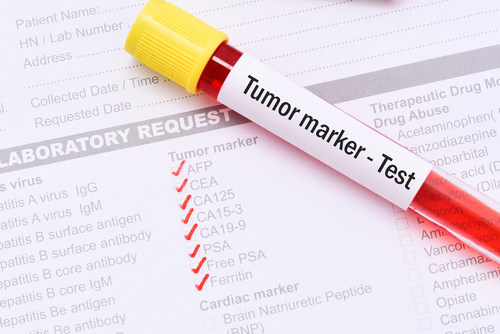This post was originally published on this site
Commonly used in primary healthcare, blood tests for CA125 may help diagnose ovarian cancer and other types of cancer, particularly in older individuals, new research suggests.
The findings were described in two presentations at the recent 2019 National Cancer Research Institute (NCRI) Conference in Glasgow, UK. The sessions were titled, “The predictive value of CA125 for ovarian cancer in General Practice: a population-based cohort study of over 50,000 women,” and “The incidence of non-ovarian cancers in women with elevated CA125 levels in General Practice.”
“Our work shows that CA125 is a very useful test for detecting ovarian cancer in general practice,” Garth Funston, a researcher at the University of Cambridge and co-investigator on the study, said in a press release. “This could help guide decisions made by GPs [general practitioners] and their patients about the need for further investigation or referral.”
Symptoms of ovarian cancer, such as bloating and abdominal pain, can be fairly non-specific. Blood tests have been proposed as a non-invasive strategy to identify individuals with these symptoms who are more likely to have cancer so that they can be referred for further testing.
One such blood test measures CA125 (cancer antigen 125), which is often elevated in the blood of people with cancer, particularly ovarian cancer. Testing for CA125 is already routine in many places, but the new research is the first to assess the test’s usefulness for GPs.
“It’s important that GPs have effective tools to detect ovarian cancer early and ensure patients are referred appropriately. While CA125 is widely used in general practice in the U.K. and internationally, prior to this study, it was unclear how effective a test it really was in general practice,” Funston said.
The presentations included data on 50,780 women in England whose GPs administered CA125 blood tests between 2011 and 2014. The researchers compared the results of these tests with data on whether the person in question was diagnosed with cancer (ovarian or non-ovarian) in the year following their test.
Overall, about one in 10 individuals with high CA125 levels (more than 35 units/mL) were eventually diagnosed with ovarian cancer. Notably, this rate is much higher than previous estimates — for example, it is 10 times higher than the estimates from the U.K.’s 2011 National Institute for Health and Care Excellence (NICE) guidelines.
But rates of ovarian cancer varied considerably with age: among those with high CA125 levels, rates of ovarian cancer were 15.2% in individuals older than 50 and 3.4% among those younger than 50.
Additionally, the researchers determined cut-off values above which an individual’s risk of ovarian cancer is at least 3%, which is the threshold at which NICE recommends referral for further testing. These cut-off values were 41 units/mL in individuals older than 50 and 76 units/mL in those younger than 50.
The findings from the second presentation also suggest that people with elevated CA125 levels are at greater risk for other cancer types. In individuals older than 50, 17.3% of those with high CA125 levels developed non-ovarian cancers, as compared with 2.8% of those with lower CA125 levels. In people younger than 50, these rates were 2.7% and 0.7%, respectively.
Most of the non-ovarian cancers diagnosed in individuals with high CA125 levels were located in the chest/abdomen, including pancreatic, lung, and uterine cancers. The researchers wrote that, particularly for people with abdominal symptoms and high CA125 levels, clinicians should “consider performing appropriate investigations for these cancers in order to avoid diagnostic delay, particularly if ovarian cancer has been excluded.”
Shibani Nicum, the chair of NCRI’s ovarian cancer subgroup and consultant medical oncologist at Oxford University Hospitals, who was not involved in the research, said: “Diagnosing more cases of ovarian cancer at an early stage could have a big impact on survival and GPs are an essential part of that process.”
“These findings could help doctors interpret test results and inform their decisions about which tests their patients need next,” she added. These findings “can also be used to expand on existing clinical guidelines, both in the U.K. and other countries, to improve ovarian cancer diagnosis at the national and international level.”
The post CA125 Blood Test May Help Alert GPs to Ovarian and Other Cancers, Research Shows appeared first on Ovarian Cancer News Today.
The post CA125 Blood Test May Help Alert GPs to Ovarian and Other Cancers, Research Shows appeared first on BioNewsFeeds.


